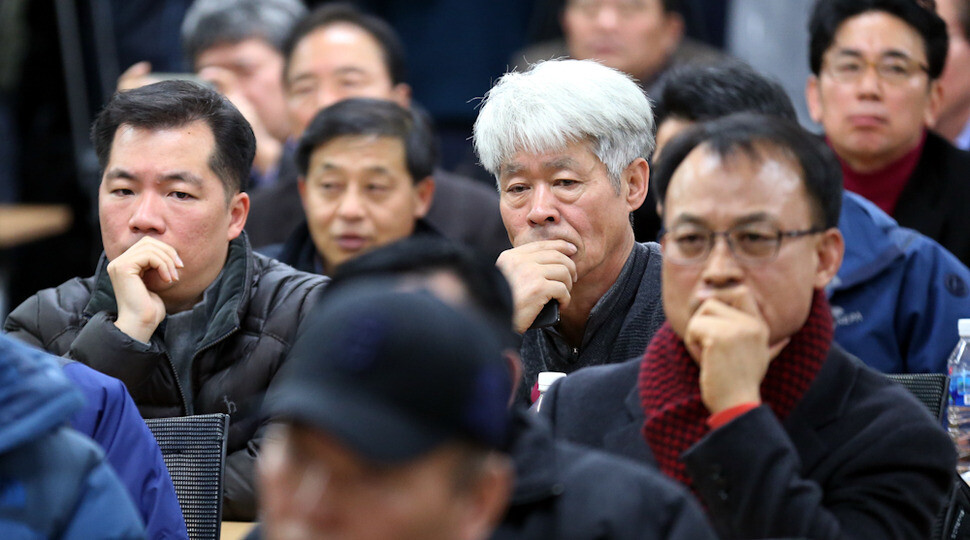hankyoreh
Links to other country sites 다른 나라 사이트 링크
The government’s decision to shut down Kaesong may have been illegal

While on Feb. 12 the government announced relief measures for the tenant companies at the complex, including pushing back the repayment schedule for their debts, the 124 companies are not ruling out the possibility of a lawsuit if the government does not compensate them fully for their losses. The companies argue that, if the decline in their credit rating and the compensation they will have to pay to their subcontractors are taken into account, the damage from shutting down the Kaesong Complex will be much greater than the government estimates.
Legal professionals suggest that the government’s decision to completely suspend operations at the complex was an illegal move without any legal basis and that companies could therefore sue the government for compensation.
In the past, no companies have successfully sued the government in connection with its ban on new investment in the complex or its measures to suspend inter-Korean economic cooperation. The courts have given the government wide-ranging discretion to act in line with complicated political calculations on such matters.
But this time, since the government’s complete suspension of operations at the complex constituted a de facto appropriation of the companies’ property rights, the situation may be different than before, some think.
“North Korea may have frozen assets at the complex, but this doesn’t change the fact that it was illegal for the South Korean government to appropriate the property rights of tenant companies without any legal basis,” said Kim Gwang-gil, a lawyer who previously managed the legal team for the Kaesong Industrial Complex Management Committee.
Another option for the tenant companies is to ask for arbitration against North Korea. Considering that North Korea’s decision to freeze the companies’ assets has caused them additional losses, they could file a petition for arbitration with the Inter-Korean Commercial Arbitration Committee, which would be set up with the consent of South and North Korea according to an agreement about guaranteeing inter-Korean investment. But practically speaking, North Korea is not likely to consent to such arbitration.
By Seo Young-ji, staff reporter
Please direct questions or comments to [english@hani.co.kr]

Editorial・opinion
![[Column] Park Geun-hye déjà vu in Yoon Suk-yeol [Column] Park Geun-hye déjà vu in Yoon Suk-yeol](https://flexible.img.hani.co.kr/flexible/normal/500/300/imgdb/original/2024/0424/651713945113788.jpg) [Column] Park Geun-hye déjà vu in Yoon Suk-yeol
[Column] Park Geun-hye déjà vu in Yoon Suk-yeol![[Editorial] New weight of N. Korea’s nuclear threats makes dialogue all the more urgent [Editorial] New weight of N. Korea’s nuclear threats makes dialogue all the more urgent](https://flexible.img.hani.co.kr/flexible/normal/500/300/imgdb/original/2024/0424/7317139454662664.jpg) [Editorial] New weight of N. Korea’s nuclear threats makes dialogue all the more urgent
[Editorial] New weight of N. Korea’s nuclear threats makes dialogue all the more urgent- [Guest essay] The real reason Korea’s new right wants to dub Rhee a founding father
- [Column] ‘Choson’: Is it time we start referring to N. Korea in its own terms?
- [Editorial] Japan’s rewriting of history with Korea has gone too far
- [Column] The president’s questionable capacity for dialogue
- [Column] Are chaebol firms just pizza pies for families to divvy up as they please?
- [Column] Has Korea, too, crossed the Rubicon on China?
- [Correspondent’s column] In Japan’s alliance with US, echoes of its past alliances with UK
- [Editorial] Does Yoon think the Korean public is wrong?
Most viewed articles
- 1‘We must say no’: Seoul defense chief on Korean, USFK involvement in hypothetical Taiwan crisis
- 2N. Korean delegation’s trip to Iran shows how Pyongyang is leveraging ties with Moscow
- 3‘Weddingflation’ breaks the bank for Korean couples-to-be
- 4Korea sees more deaths than births for 52nd consecutive month in February
- 546% of cases of violence against women in Korea perpetrated by intimate partner, study finds
- 6Will NewJeans end up collateral damage in internal feud at K-pop juggernaut Hybe?
- 7[Column] Park Geun-hye déjà vu in Yoon Suk-yeol
- 8[Editorial] New weight of N. Korea’s nuclear threats makes dialogue all the more urgent
- 9Amnesty notes ‘erosion’ of freedom of expression in Korea in annual human rights report
- 10“Parental care contracts” increasingly common in South Korea